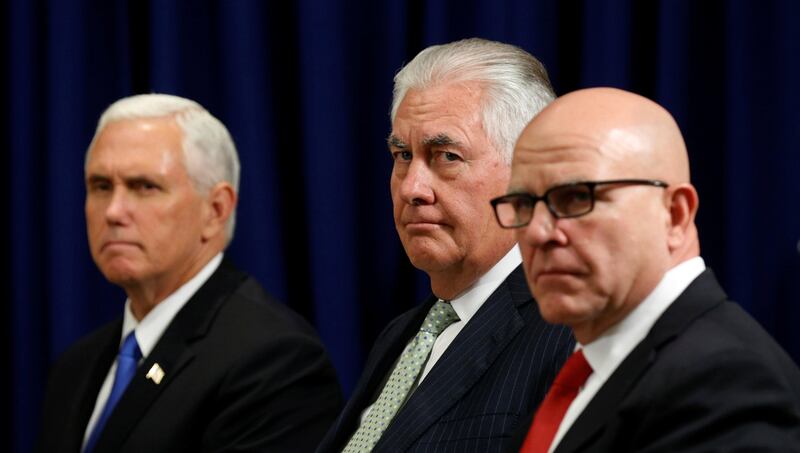The Trump administration is leaning toward “decertifying” the Iran nuclear deal in the next few weeks in an attempt to reopen negotiations in a more holistic approach towards addressing Tehran.
Under US law, a 90 day review is required for the deal known as the Joint Comprehensive Plan of Action (JCPOA) to be submitted to Congress. The Trump administration has so far certified Iran’s compliance twice since it has taken office, but is now inclined to do otherwise before the next deadline on October 15, a US administration official and diplomatic sources in New York said.
But some people in close contact with the administration and regional diplomats, cautioned that any final decision will only come from Donald Trump, and he could change his mind on the deliberations.
A US administration official told The National that the Trump team is "leaning in the direction of decertifying the deal" which would then kick the ball to Congress to decide its fate by either reimposing nuclear-related sanction or forcing negotiations on the ballistic missile threat and other issues related to its expiration date.
US National security adviser HR McMaster said on Thursday that any Iran announcement on the nuclear deal “will fit into a fundamentally sound and broad strategy aimed at addressing Iran’s destabilizing behavior and prioritizing protecting American vital interests,”
Mr McMaster confirmed on CNN that Mr Tump is seeking to “renegotiate” portions of the deal related to its sunset clause and Iranian ballistic missile programmes.
Mark Dubowitz of the Foundation of Defense of Democracies and in close contact with the administration on Iran, told The National that the White House is planning to “roll out a comprehensive rollback strategy against the Iranian regime which includes a strategy to fix the fatally flawed the JCPOA that gives Tehran patient pathways to nuclear weapons and intercontinental ballistic missiles.”
Mr Dubowitz said it was highly likely that Mr Trump would refuse to certify the deal by October 15. It would then be up to congress to decide to reinstate the sanctions suspended or lifted under the JCPOAhe said. “Congress is unlikely to do so if they believe the administration has a serious rollback and plan to fix the deal,” the expert added.
The decertification in itself automatically provides a 60-day window for Congress to decide whether to reimpose sanctions that were in place in 2015 and could dismantle the deal. This kind of threat what the US administration is looking for to bring European partners to the table to renegotiate the JCPOA.
“The credibility of Mr Trump’s walk away threat is motivating the Europeans to find a transatlantic consensus on how to fix the deal” said Mr Dubowitz.
NBC reported on Wednesday that the Trump administration is weighing another option besides decertification. “It would give European allies 90 days to get on board with renegotiation — rather than punt the decision to Congress.” Such a move would be less severe than decertification but would only be acceptable for the White House if it can get the Europeans on board with amending the agreement related to the ballistic missile threat.
Unlike the last debate the Trump administration had on Iran in July, there is more conformity among senior officials in the administration on the need for a holistic approach in addressing Iran including its regional behavior.
US secretary of state Rex Tillerson who argued for certifying the deal last July said on Wednesday: "We clearly have significant issues with the agreement.”
"There was clear expectations of the parties who were negotiating this nuclear deal that a conclusion of the nuclear agreement, which set aside, obviously, a serious threat to the region and to the relationship, and that by doing so this would allow the parties to seek a more stable, peaceful region.
“We have seen anything but a more peaceful, stable region. And this is the real issue."
While the agreement itself was designed to only address the nuclear programme, the US secretary of state introduced Iran’s support for the Assad regime, provocative actions in the Gulf, malicious cyber activity, development and testing of ballistic missiles, actions in Yemen and Iraq as metrics for the Trump administration that the agreement is falling short.
Mr McMaster stressed the same concerns. "What's different about the president's approach is he didn't just look at the Iran deal, he placed his decision on the Iran deal on broad context of how we protect American citizens, American interests, how we protect our allies and partners from Iran's broad range of destabilizing behavior,” he told CNN.
Mr Trump addressed another nuclear threat yesterday in announcing new economic sanctions against North Korea. The US president also met the prime minister of Japan Shinzo Abe and the South Korean president Moon Jae-in, separately and then in a trilateral meeting.







